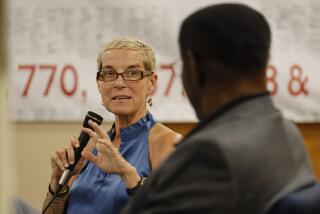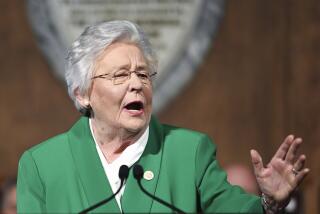Carey Loves Trouble, With a Capital ‘T’ for Teamsters
Plagued by enemies within his union and troubled by a federal grand jury investigation into the financing of his narrow reelection win last year, Teamsters President Ron Carey didn’t need any more burdens.
But he took on yet another stiff challenge when 185,000 Teamsters walked out against United Parcel Service on Aug. 4. Since then, the 61-year-old Carey has directed a strike that, for better or for worse, could prove to be a defining moment for organized labor in the late 1990s.
“The Teamsters fight has become America’s fight,” Carey said Friday afternoon, looking tired but sounding determined after an exhausting 21 hours of talks that began Thursday morning.
His rhetoric indicated that, far from being worn down by the pressures of a national strike and internal union controversies, Carey has been revitalized. Suddenly, the head of the nation’s biggest private-sector union also has taken center stage as a preeminent spokesman for the nation’s labor movement.
Carey’s associates say he is being driven by issues he is passionate about: the need to produce more good full-time jobs and to fight the spread of lower-paid part-time work. Much of the public seems to be responding to the call, as several opinion polls have shown widespread sympathy for the striking drivers, package sorters and loaders.
His union rivals and UPS officials, on the other hand, raise questions about whether Carey is mainly interested in deflecting criticism and safeguarding his own future as a union leader. A federally appointed election monitor is weighing whether to require a new Teamster leadership election amid continuing revelations of possible finance irregularities in the 1996 presidential contest.
The media spotlight “gets his adrenaline flowing; there’s no doubt about it. He’s at the center of attention. I just hope he’s at the center of attention for members, and not for Ron Carey,” said Mario Perrucci, who was a Teamster vice president until being ousted last year on internal union charges of accepting improper gifts and who now works as a Dean Witter stockbroker in New Jersey.
Carey, a plain-spoken man with slicked-back hair and an accent reflecting his deep roots in the New York borough of Queens, represents a troubling contradiction for the labor movement.
A Study in Contrasts
In 1991, he won his first term as president of the Teamsters as a reform candidate, pledging to rid the union of its legendary corruption. The federally supervised vote was the first Teamster presidential election allowing voting by rank-and-file members since the union was founded just after the turn of the century.
Since then, Carey has won praise for tossing out allegedly corrupt local union leaders across the country. He has been regarded by Clinton administration officials as pivotal to the Teamster reform effort.
“He’s very important because there’s no one who can take his place in the Teamsters,” said Richard Hurd, a professor of labor studies at Cornell University in Ithaca, N.Y. “There’s no one on the reform side of the Teamsters with broad enough appeal to win an election if there’s going to be a rerun election for president.”
What’s more, Carey is closely tied to the new, more aggressive leaders of the national AFL-CIO and has emerged as a major voice in efforts to revive long-slumbering American unions by stepping up worker-organizing campaigns. Thus, a bad stumble by Carey could damage organized labor.
Carey’s direct, unadorned manner reflects his working-class background. Not only did Carey once work as a UPS driver, but his father also was with the company for more than 40 years. Until the early 1990s, Carey and his family lived for years in the same Queens duplex, while his parents lived in the building’s other unit.
Critics, though, point out that Carey has failed to unite the bitterly divided leadership of the union, to come up with a way to replenish its depleted strike fund or, in some cases, to negotiate successfully with employers.
“The contract he negotiated [with UPS] in ’93 opened the floodgates to part-timers,” said Richard Leebove, spokesman for James P. Hoffa, who was Carey’s election foe last year and remains his principal opponent.
While expressing support for the UPS strikers, Leebove called Carey “a born-again fighter against part-time America.”
Leebove and other Hoffa associates also raise charges that Carey has a history of alliances with Mob-connected figures and has engaged in financial misdeeds that have enabled him to amass substantial personal real estate holdings. The Carey camp has dismissed the charges as politically motivated complaints drummed up by “old guard” Teamster leaders angered by Carey’s anti-corruption efforts.
In addition, a federally established review panel cleared Carey of similar charges in 1994.
Yet even though Carey has not been implicated in any wrongdoing, his grip on the helm of his 1.4-million-member union just before the UPS strike began was starting to look precarious.
Problems From Within
One of his key political advisors, Washington consultant Martin Davis, was indicted in June on fraud charges in connection with allegations that union money was illegally funneled into Carey’s reelection campaign. He has pleaded not guilty.
A Teamster consultant, telemarketing specialist Michael Ansara, pleaded guilty to a count of fraud after admitting to making an illegal donation to the Carey campaign.
Then, in late July, came the resignation of William W. Hamilton Jr., the union’s top lobbyist in Washington and a Carey recruit. Hamilton quit after refusing to continue cooperating with the federal grand jury.
The grand jury also reportedly is looking into whether the Carey campaign and the Democratic National Committee set up an improper mutual-assistance pact.
“If any of these things occurred, Ron had no knowledge of them,” said Nancy Stella, a Teamster spokeswoman, referring to the alleged campaign finance abuses. “He certainly wouldn’t have approved of any of these kinds of activities. Everyone in the union has been instructed to cooperate fully with the grand jury investigation and the investigation by the federal election officer.”
Amid the controversy, Barbara Zack Quindel, the official who monitored last year’s election, has held off on certifying the ballot count. That, in turn, has raised the prospect that Carey will face a rerun election against Hoffa, son of the legendary Teamster leader Jimmy Hoffa. In the uncertified election results tallied in December, Carey posted a 52%-to-48% edge.
Regardless of whether Carey is fighting for his own legacy or the union’s, his hands are full these days. He has staked out tough-to-compromise positions in contract negotiations. The Teamsters want substantially more full-time jobs for workers currently restricted to part-time positions.
And the union, saying it is acting to ensure the safety of its members’ retirement funds, is flatly refusing a UPS proposal to create a pension plan exclusively for UPS workers. UPS wants to withdraw from the traditional multi-employer plans covering the Teamsters, saying it shouldn’t have to subsidize the retirements of other companies’ employees.
Carey Reaches for Big Picture
In taking on this fight, Carey has cast his cause as transcending the UPS labor dispute. He portrays his members as carrying the banner for all organized labor and for millions of nonunion workers unnerved by an economy in transition.
Joining Carey in framing this strike as a fight with far-reaching consequences is the national AFL-CIO, the parent of the nation’s major unions.
AFL-CIO President John Sweeney, posted at Carey’s side in Teamster headquarters on Tuesday, promised that the labor movement would loan the Teamsters the $10 million a week needed to pay strike benefits for “many, many weeks,” if necessary, to those walking the picket lines. Each striker will get $55 a week.
Carey can look good in winning or look bad in losing, but there’s not much room in the middle, labor experts say. “He’s established high expectations. Now the pressure is on him to deliver,” said Greg Tarpinian, a New York-based consultant to labor unions.
If the Carey-led Teamsters win a strong contract at UPS, and their strike is perceived as successful, the payoff for the labor movement is fresh organizing momentum.
Unions hope to recapture some of the enthusiasm of the activist 1930s, when the United Auto Workers won a groundbreaking contract at General Motors.
GM was “at the center of the economy and a great American corporation,” said Robert Zieger, professor of history at the University of Florida and an expert on the labor movement.
Likewise, today UPS is a key player in “the new economy, a service-oriented economy,” Zieger said. “They like to see themselves on the cutting edge of labor relations and manpower utilization.”
It is precisely these new techniques--with emphasis on a flexible work force, including a reliance on part-timers--that spur jitters among many workers, Zieger said.
In articulating his union’s position, Carey gives every indication of relishing the media exposure. He delivers his points over and over, portraying himself as a voice of reason, the champion of workers in challenging the UPS management behemoth.
Carey also has become adept at the veteran politician’s trick of always seeming cooperative, even in turning aside shouted questions at the end of a news conference. He walks away, smiling, and says, “Thank you, thank you,” ignoring reporters looking for another comment.
Carey, who has five grown children and seven grandchildren, joined UPS in 1956 at the age of 20, after completing a hitch in the Marines. Within two years, he was elected shop steward, launched on a career of union activism.
He ran for president of Local 804 in New York in 1967, and UPS management threatened to fire him, according to his official Teamster biography. Carey tape-recorded the management threats, “played them at a union meeting and went on to win the upset victory that management tried to deny him.”
Carey has been president of the local ever since, even today. Departing from traditional Teamster practice, however, officials say he takes only one salary from the union, the one that he gets for heading the entire Teamster union.
And even that salary Carey only takes in part. Although the union’s constitution calls for its leader to receive $225,000 a year, he voluntarily cut his salary to $150,000 after taking office.
As the leader of Local 804, Carey won the first contract providing “25 and out”--a full pension after 25 years of service--at a time when other Teamster contracts required 30 years for a pension.
Carey is a stubborn man once he makes a decision. Local 804 stayed out on strike for nine weeks against UPS to win the improved pension. The national union opposed Carey’s approach. The union leaders “didn’t like the idea that Carey was trying to do better than the other UPS contracts around the country,” according to “The Teamsters,” a 1978 book by writer and editor Steven Brill.
Stella said another telling moment for Carey came in the three-week Teamster freight industry strike in 1994. Carey suddenly took off for two days, and his whereabouts were unknown to many of his associates. It turns out, Stella said, that Carey took off in his car to visit union members at East Coast locals.
“He obviously felt the need to get away from all of the noisy meetings and the clamor of Washington, and to see members and take the pulse of what was going on,” she said.
“If you want to see him in his natural habitat, you have to see him on the road, visiting locals and meeting with members.”
Silverstein reported from Los Angeles and Rosenblatt from Washington.
* LITTLE PROGRESS: Marathon UPS-Teamsters talks continue. A9
More to Read
Get the L.A. Times Politics newsletter
Deeply reported insights into legislation, politics and policy from Sacramento, Washington and beyond. In your inbox three times per week.
You may occasionally receive promotional content from the Los Angeles Times.










